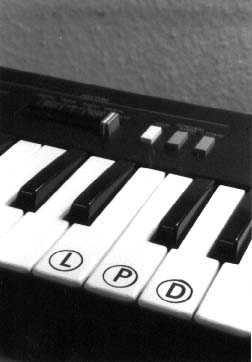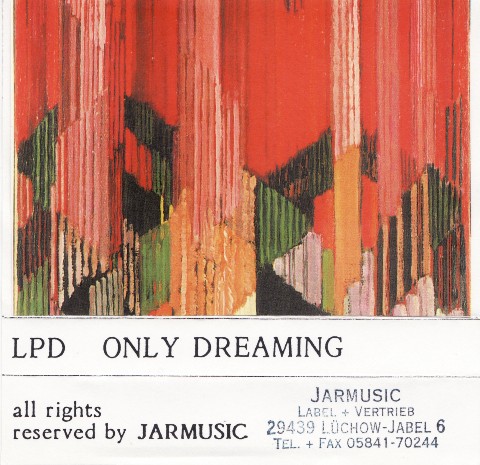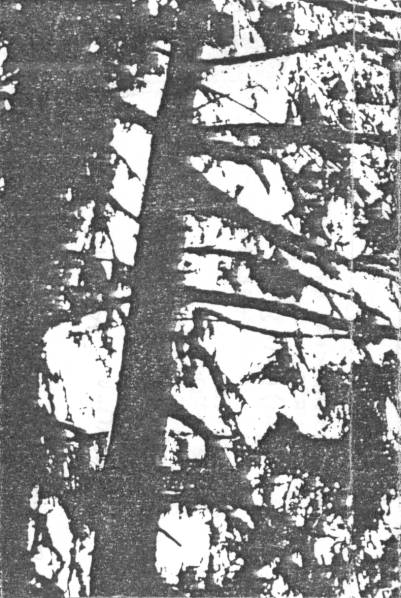
Edward Ka-Spel‘s brilliance with The Legendary Pink Dots is to introduce us to isolated characters and then immerse us in their world-view through expansive and mysterious soundscapes. He begins with the most restricted, infinitesimal point of consciousness and then slowly expands it outward towards a state of ‘cosmic consciousness’ (to use the phrase of 1960s psychonauts). Musically, he often follows this template of expansion, with simple melody lines repeating and layering in increased complexity of texture. Much of the LPD’s music is an undertaking to help the listener (and perhaps composer) escape his/her own head. Lyrical phrases, musical motifs, album titles and themes recur across decades, but tonal shifts between albums are slow and subtle. Hopefully, The Legendary Dots Project, like the Residents and Sparks projects before, will provide the keen reader and listener with a giddy entry-point into the Legendary Pink Dots’ musical world. Fulfil the prophecy!
Tom: Only Dreaming is weird, but this is weirdness which is far from mere whimsy. There are warped scenarios of violation, sexual possessiveness and apocalypse; presided over by malevolent individuals and authorities. They carry all the more sting due to the seeming innocuousness of Edward Ka-Spel’s lisping Southern English tones. He finds absurdity in the commonplace and takes a matter of fact, bathetic approach to the macabre.
K-S’s lyrics are densely allusive; the album contains references to the Bible, two Little Richard hits, and Sellers & Loren’s ‘Goodness Gracious Me’; as well as Marlon Brando, the Beach Boys, Flash Gordon and William Blake. A song is titled in Latin and there’s a pointedly German exhortation in ‘Guess the Politician’: “Alles zuzamman”, which means “all together”. That track is one of several highlights; over a gorgeous, weightless coil of synth notes is a deft, surreal assault on jingoistic, Tory values: “This indecision here in Late Britain, I hate Britain! Kind of wish I’d been born a fish…” The absurd 18th century bombast of ‘Rule Britannia’ is mocked at the close, fading into ellipsis like a Tebbit’s heart.
The album contains an undercurrent of oblique references to its fraught political times, with the ascendancy of Reagan and Thatcher; the Cold War reheating, unemployment spiralling to its highest point since the 1930s, riots in the cities. The surface buoyancy of ‘Waiting for the Call’ masks a chilling tale of political brutality and enforced conformity. Brixton is mentioned and the police are not a cosy Dixon of Dock Green presence; K-S’s invective is forceful and sardonic: “For your local laughing policeman’s only happy when you’re writhing in a heap. Learned our lessons. We keep in line.”
This was, indeed, the era of apocalyptic top 20 hits like UB40’s ‘The Earth Dies Screaming’ and Kate Bush’s ‘Breathing’. Heaven 17’s vivaciously righteous ‘(We Don’t Need This) Fascist Groove Thang’ represented just how the post-punk counter-culture railed against the new Thatcherite ‘authoritarian populism’, identified by Stuart Hall as early as 1979. ‘Ghost Town was at number 1 in the summer. Post-nuclear war lament ‘Final Day’ by the Young Marble Giants graced the Peel show; Andrzej Zulawski’s berserk cinematic attack Possession riled and baffled in equal measure, eventually gaining a cult following after being banned in the UK as a ‘video nasty’.

‘Breakday’ concerns the despondency of a progressive political group: “Breaking down together en masse […] And though we wanted to change things, the fact remains, we never tried”. EK-S’s alliterative lines convey dread and the collapse of meaning and confidence: “The slogans turned to secrets. The symbols turned to stains.” The citizen is assailed by brute power: “A nurse hid and shivered as an army axed her door.”
Throughout, the music is charged with decayed promise. Imagine the concurrent Young Marble Giants playing even more rudimentary keyboards, recorded under an eiderdown in a Carshalton shed. The instrumentals and backdrops conjure an Armageddon-addled Blighty on a shoestring. A keyboard – that sounds not unlike the Yamaha Portasound PS-200 I played as a child – is sometimes pummelled into submission, at others allowed to drift gauzily, evoking a mood both wistfully charming and subtly unnerving. Instrumental soundscapes ‘It Rots Your Liver’ and ‘Game’ suggest alien worlds with their siren bleeps and BBC Radiophonic Workshop style oscillations.
Intermittently, an utter melodiousness chaperones the malodorous lyrical content. ‘Defeated’ anticipates the Russian Futurists’s spry synth-pop of twenty years hence, while pondering the queasy delights of “Belladonna squash”. ‘Frosty’ has a cheery, major-key bounce; in somehow apt counterpoint to its absurdist story of bullying – with the victim protected thus: “So we placed his face in a smash-proof case and placed it in the fridge”! ‘Voices’ is a sublime highlight, with an evocative synth canvass embellished by plangent guitar – and later, lovely shrill lead curlicues over the everglades of wistfulness. A romantic accompaniment to a tale of paranoia, ‘heresy’ and the singer’s haunting by ‘Christine’. 1970s British horror film signifiers – the sample “Burn ’im!!” – mingle with piquant lyricism: “The sun steps down to dance on the armour now rusted and brittle like September leaves”.
There is the Weird England of ‘Phallus Dei’ (‘God’s Penis’). An ambiguous Yeatsian narrative of a God’s rape of Christina, who’s clinging to chaste dreams of Englishness; the refrain: “I will think of England, of trees in summertime. Of leafy lanes, of daisy chains, of Grandad’s rhubarb wine” is winsomely recited by a wraithlike lady’s voice; then she is told to run and hide. She should seek sanctuary where? In typically LPD fashion: in a shoe.
This is a captivating lo-fi debut, with Ka-Spel figuring as a kind of English Daniel Johnston, writing in just as individual a manner, but with an elliptical yet acute eye on society and politics in 1981.
Only Dreaming? The lad recants too much. This album has more that compels in its hour than many bands have in their entire oeuvres.
Matt: Before starting this project, I only had two albums by the Legendary Pink Dots, Nine Lives To Wonder and It’s Raining In Heaven — I liked them both, but I didn’t listen to them super frequently. To compare to the Residents Project, I’m in the Aila position, hearing about 99% of these albums for the first time. In my expectations, I’m going off of those two albums (which were pretty dark and experimental sounding) and what I’ve heard about the Dots. So, when I put on Only Dreaming, I was kind of surprised to find out how… poppy it is.
Don’t get me wrong, you’re not likely to hear any of these cuts on Top 40 or anything, but for a band I’d kind of mentally filed alongside bands like Coil (whom, I’ve discovered, show up on a lot of various artists compilations alongside the Dots), this stuff is downright friendly… maybe less so lyrically, but musically! “Waiting For the Call/You ‘n’ Me” is, in fact, a pop classic — or at least one in the alternate universe that I get to control. The alternate universe where pop songs have kind of upsetting lyrics. That said, I’d also noticed that on more than a few of those various artists compilations, there’s also been the Cleaners From Venus, so that probably should have tipped me off that it wasn’t going to be as noisy/Industrial as I was expecting. And, oddly enough — I can actually hear comparisons with both of those bands and the Dots. As strange as it sounds, it makes sense to me that they’d be at home equally next to Coil as the Cleaners. The track “It Rots Your Liver”, is probably the closest to the version of the Dots I had in my head.
So, what do I think of one of my first Dots experiences? I really, really dig it. I’m a sucker for a great pop song AND for using different and strange sounds in music, so, well, it makes sense that this would hit my brain’s sweet spot pretty much square on. I wonder why it took me this long to figure out that the Legendary Pink Dots were the sort of thing I like, even when I had a couple albums previously. Sometimes I can be a real dummy, I guess.

Adam: Murderously possessive husbands; junkie messiahs; corrupt politicians – Edward Ka-Spel’s view of 1980s Britain is downbeat and grubby, but it also trades in theatrical archetypes, perched malevolently somewhere between the absurdist kitchen sink plays of Edward Bond, Harold Pinter and Philip Ridley and the piss-stained streets of the inventively crass British animated series Monkey Dust (2004). Ka-Spel’s protagonists are sometimes genuinely frightening, but they also exist as bloated parodies of themselves, as though playing through pre-ordained roles that have already become tired and stale. These figures are both pathetic and seductive, as in the manner of the emasculated male perverts of early Pulp. As narrators they cast a malev(i)olent spell over the listener, which he or she is not quite able to shrug off through laughter. Sometimes the violence becomes intimate enough to become distressing, as in the case of ‘Thursday Night Fever’, which talks bone-chillingly of “Curtains closing faster, faster”, turning “young lovers to statistics.” Sometimes, the effect is distancing, as in ‘Black Highway’, which paints a scene of a J.G. Ballard-style motorway crash, with vocal phrases lifted from 1950s pop and rock & roll songs, giving Ka-Spel the chance to deliver a particularly charismatic and playful vocal performance. In two especially notable instances, we focus upon the victims of violence – a (possibly mythological) rape victim in ‘Phallus Dei’, in which April White provides a crushingly vulnerable vocal performance; and a bullied and abused young boy in ‘Frosty’, who escapes his perpetrators by hiding in a fridge.
While some of these character portraits are abstract, the setting is often quite specifically British. The remarkable ‘Waiting for the Call – You ‘n’ Me’ charts streets lined with ciggy packs, plastic bags and broken bottles and then later refers to “bombing Brixton”. Esoterically, it even seems to suggest S&M as a potential escape from Thatcherism. ‘Frosty’ has the bullied boy eating tea cakes and fish cakes; while ‘Phallus Dei’ includes a sad, bitter line about lying back and thinking of England – a bucolic past of drinking “grandad’s rhubarb wine” that is a universe away from these bombed-out industrial Hellscapes. Most bitter and sardonic of all is ‘Guess the Politician’, which sounds like it could be describing austerity Britain in 2013. The politicians hiding in their bunkers shedding crocodile tears over the deaths of the poor and vulnerable (while secretly noting how this helps solve problems of unemployment and immigration) could easily be the Tory cabinet ministers who have brutally decimated the benefits system and outsourced the welfare of the country’s disabled people into the hands of an unfeeling over-shores IT firm. It is the kind of song you can imagine the Kinks or Syd Barrett performing on acoustic guitar, but here it is performed on on a washed-out synth and murky keyboards. More broadly, some of the songs evoke British nursery rhyme and folk traditions, with ‘Before the End’ sounding like nothing so much as a satanic Punch & Judy show. To these ears, ‘Voices’ with its synthesized wind sounds and whispery vocal delivery bares a curious similarity to the accompanying music for strange, woozy 1970s children’s television programming like Children of the Stones (1976) and The Changes (1975).
Musically, Only Dreaming is a gratifying mix of the dissonant and the genuinely lovely. Many of the pieces are essentially spoken word poems delivered over simple melodies, which are made more complex by multi-tracking the vocals and keyboard lines into textured soundscapes. The effect this creates is singular. While the low-fi production ensures that many of the sounds are weedy and shrill, they are simultaneously enveloped in a murky synthesized fuzz that is wet and enveloping. There is a wonderful mix of the organic and the mechanical. The synths and keyboards warble and wheedle, but are given anchorage by tinny drum machines, that would sound amateurish in most other contexts, but work astonishingly well here. On some tracks the volume fluctuates, almost going up-and-down in waves, adding to the effect of churning mechanical cyclicalness. For a debut album, the sum of the parts is surprisingly fully-formed. The technique of a squelchy wash of keyboards with a simple tinkling melody over the top is a good one and predates John Maus by several decades. In other places these gloaming soundscapes recall Joy Division or some of the more abstract moments on Pink Floyd’s The Wall (1982).
More importantly though is the way in which Only Dreaming sets up some of the major concerns of later LPD releases. ‘Defeated’ contains the Dots’ first reference to “Belladonna”; ‘Waiting for the Call’ expresses the desire to live on an island, which will crop up later in the Dots’ oeuvre; while the political disgust of ‘Guess the Politician’ anticipates both The Tower (1984) and Island of Jewels (1986). Indeed, Only Dreaming marks the first appearance of ‘Break Day’, a muted and low-key precursor to the definitive version on The Tower. It is hard to work out whether the subjects of the song are anarchists or just vigilantes. The lyrics dredge up images of war atrocities, yet these are clearly domestic – the violence of the album is taking place in Britain. At one point in the song, Ka-Spel almost seems to levy an accusation at himself, spitting: “You had the brains, you had the money, you could have bought a plane and skipped this hole for somewhere sunny.” At this juncture, The Legendary Pink Dots were a British garage band, but you can already hear them straining at imposed limitations, reaching for a more ambitious and psychedelic vision. However, Only Dreaming, containing tracks as fine as ‘Voices’, ‘Frosty’, ‘Waiting for the Call’ and ‘Guess the Politician’ is in itself a significant achievement.










